Books
Books
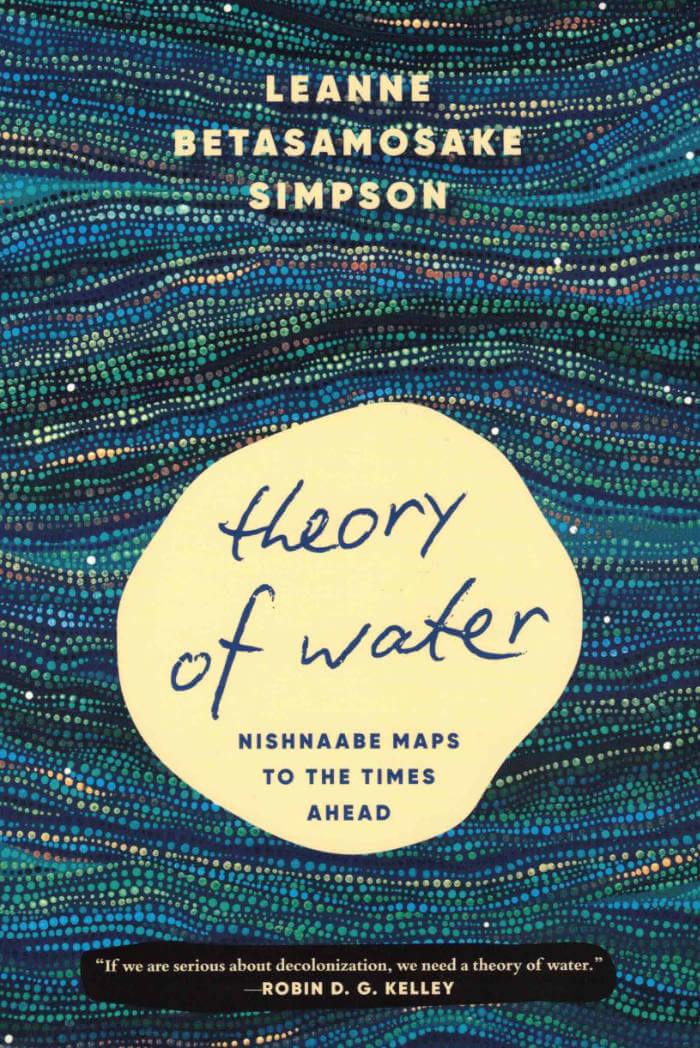
Theory of Water
A genre-bending exploration of that most elemental force—water—through Indigenous storytelling, personal memory, and the work of influential artists and writers.
For many years, Leanne Betasamosake Simpson took solace in skiing—in all kinds of weather, on all kinds of snow across all kinds of terrain, often following the trail beside a beloved creek near her home. Recently, as she skied on this path against the backdrop of uncertainty, environmental devastation, rising authoritarianism and ongoing social injustice, her mind turned to the water in the creek and an elemental question: What might it mean to truly listen to water? To know water? To exist with and alongside water?
So began a quest to understand her people's historical, cultural, and ongoing interactions with water in all its forms (ice, snow, rain, perspiration, breath). Pulling together these threads, Leanne began to see how a "Theory of Water" might suggest a radical rethinking of relationships between beings and forces in the world today. In this inventive work, Simpson draws on Nishnaabeg origin stories while artfully weaving the work of influential writers and artists alongside her personal memories and experience—and in doing so, reimagines water as a catalyst for radical transformation, capable of birthing a new world.
Theory of Water is a resonant exploration of an intricate, multi-layered relationship with the most abundant element on our planet—one that, as Simpson eloquently shows, is shaping our present even as it demands a radical rethinking of how we might achieve a just future.
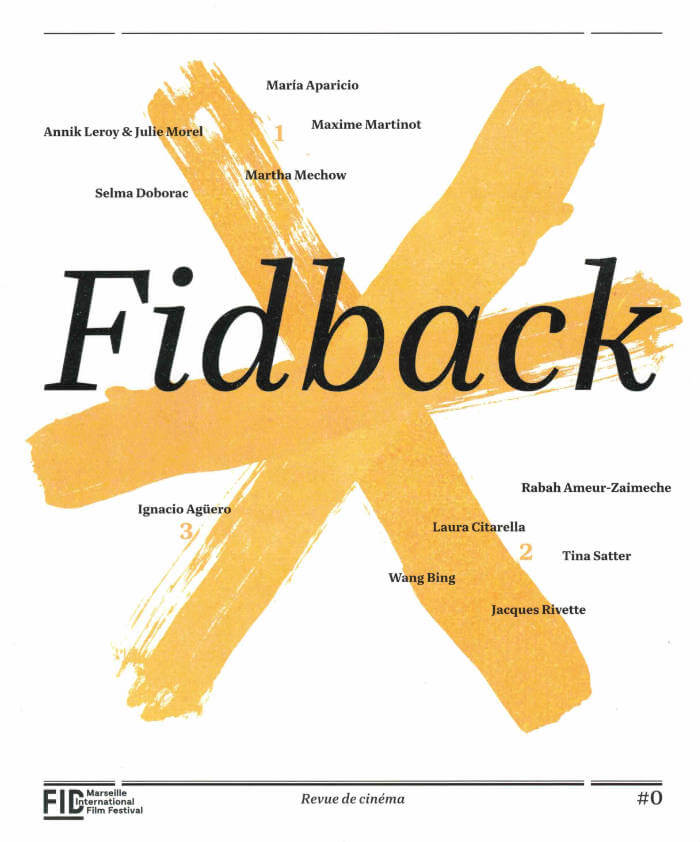
Fidback, revue de cinéma #0
Fidback est une nouvelle revue de cinéma éditée par le FIDMarseille. Chaque printemps, Fidback fera retour sur l’année écoulée : retour sur la dernière édition du FID, retour sur l’actualité mondiale du cinéma, retour sur le travail d’un·e cinéaste proche du festival, en-dehors de toute actualité.
À partir d’une dizaine de films choisis et éclairés par des textes, entretiens, documents et matériaux inédits, chaque numéro composera une image du cinéma défendu par le FIDMarseille : l’image inattendue d’un cinéma aventureux.

As If They Had A Spirit: the practice of Pontus Pettersson
As If They Had A Spirit is the first comprehensive monograph of artist Pontus Pettersson. Using drawing and narration, the book expands on Pettersson’s sculptural, poetic and choreographic practice through the accounts and fabulations of long term collaborators. As If They Had A Spirit centers the acts of re-membering, re-telling and re-tracing as situated methods for documenting and studying the protracted and evolving nature of process-based artistic practices.
Recounted and drawn by Linnea Hansander, Robert, Malmborg, Diana Orving, Karina Sarkissova, Sandra Lolax, Stina Nyberg, Anna Koch, Peter Mills, Anna Efraimsson and Galerie (Simon Asencio & Adriano Wilfert Jensen)
Edited and redrawn by Galerie (Simon Asencio & Adriano Wilfert Jensen)
Editing assistance Izabella Borzecka
Published by Galerie, Int
Co-publisher & Distibribution: PAM, Stockholm
As If They Had A Spirit was made possible with generous support by the Swedish Arts Council, Weld, MDT and PAM

Riding In Silence & The Crying Dervish
The work of Iranian-Belgian artist Mashid Mohadjerin (°1976, Teheran) is an intricate tapestry of personal and collective memory, weaving together photography, text, video, and archival material to explore themes of displacement, resistance, and identity.
Family chronicles merge with momentous political events and are set against the background of a broader history of the MENA-region. Mohadjerin uncovers invisible nuances hidden beneath the extraordinary and the familiar.
In Riding in Silence & The Crying Dervish (2025), Mashid Mohadjerin draws from the depths of her family history, unraveling the echoes of migration, forced departures, and the quiet endurance of those caught between worlds. The book builds on her previous work, Freedom is Not Free (2021), where she explored the role of women in movements of resistance across the MENA region. However, in this latest series, she turns her gaze towards the intersection of masculinity, political ideology, and displacement, examining how historical forces shape personal narratives in ways both visible and unseen.

In Concrete
Garréta’s first novel in a decade follows the mania that descends upon a family when the father finds himself in possession of a concrete mixer. As he seeks to modernize every aspect of their lives, disaster strikes when the younger sibling is subsumed by concrete.
Through puns, wordplay, and dizzying verbal effect, Garréta reinvents the novel form and blurs the line between spoken and written language in an attempt to confront the elasticity of communication.
Anne F. Garréta is a graduate of the Ecole Normale Supérieure, received her License de Lettres at the Université Paris 4 (Sorbonne), her Maitrise and her D.E.A at the Université Paris 7 (Diderot), and a PhD at New York University. The author of six novels, Garréta was coopted to the Oulipo in 2000. Her first novel, Sphinx (1986), which caused a sensation when Deep Vellum published its first English translation in 2015, tells a love story between two people without giving any indication of grammatical gender for the narrator or their lover. She won France’s prestigious Prix Médicis in 2002 and the Albertine Prize in 2018 for her book, Not One Day, which was also nominated for a Lambda Literary Award. Garréta teaches regularly in France at the Université Rennes 2, and more recently at Paris 7 (Diderot), and is a professor at Duke University.
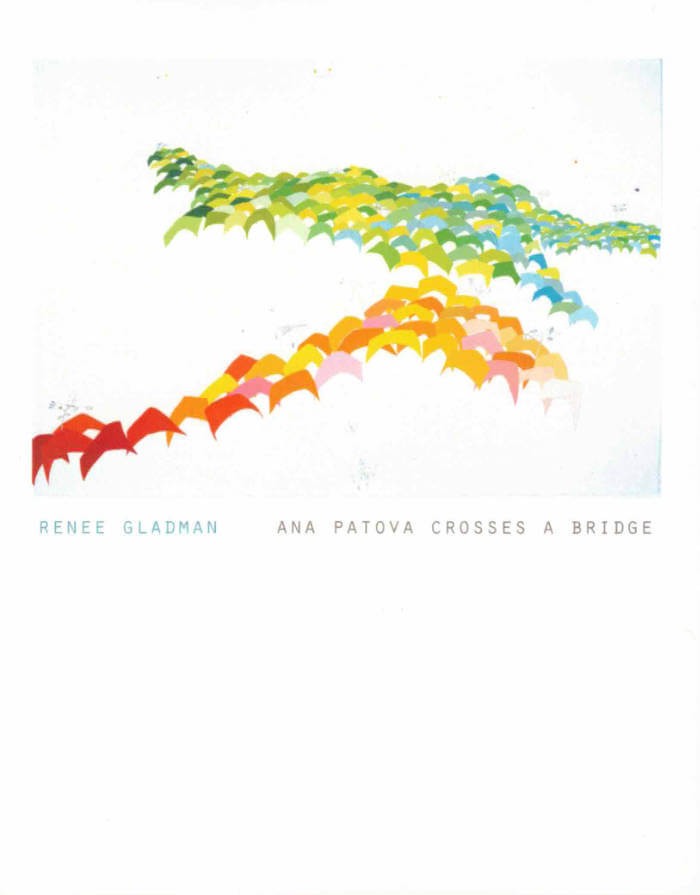
Ana Patova Crosses a Bridge
“Ana Patova Crosses a Bridge is the third volume of Renee Gladman’s magnificent, melancholy series about the city-state of Ravicka, or about the architectures of its absence. It is tempting to read the Ravickian books as an extended allegory—of architecture itself, perhaps, except that architecture is already half-allegorical, its every element raised to prefigure whatever meanings can make their way to them. If any can. In Ravicka, meanings—indeed most contact of any kind—remain in abeyance, building, in absentia, the constitutive negative spaces of the narrative. There is a plot; it lays out zones of sheer ambience. Experiences, of which there are many, unfold as a redolent lingering in the structures of immateriality, the radical realities of the insubstantial. Gladman is a philosopher of architecture, though not that of buildings. Rather, she thinks (and writes) the drifts, partitions, and immobilities of identity, affect, communication, the very possibility of being human. Profound, compelling—haunting, even—the story of Ravicka is astonishingly ours.” - Lyn Hejinian

The World With Its Mouth Open: Stories
In eleven stories, The World With Its Mouth Open follows the inner lives of the people of Kashmir as they walk the uncertain terrain of their days, fractured from years of war. From a shopkeeper’s encounter with a mannequin, to an expectant mother walking on a precarious road, to a young boy wavering between dreams and reality, to two dogs wandering the city, these stories weave in larger, devastating themes of loss, grief, violence, longing, and injustice with the threads of smaller, everyday realities that confront the characters’ lives in profound ways. Although the stories circle the darker aspects of life, they are—at the same time—an attempt to run into life, into humor, into beauty, into another person who can offer refuge, if momentarily.
Zahid Rafiq’s The World With Its Mouth Open is an original and powerful debut collection announcing the arrival of a new voice that bears witness to the human condition with nuance, heart, humor, and incredible insight.
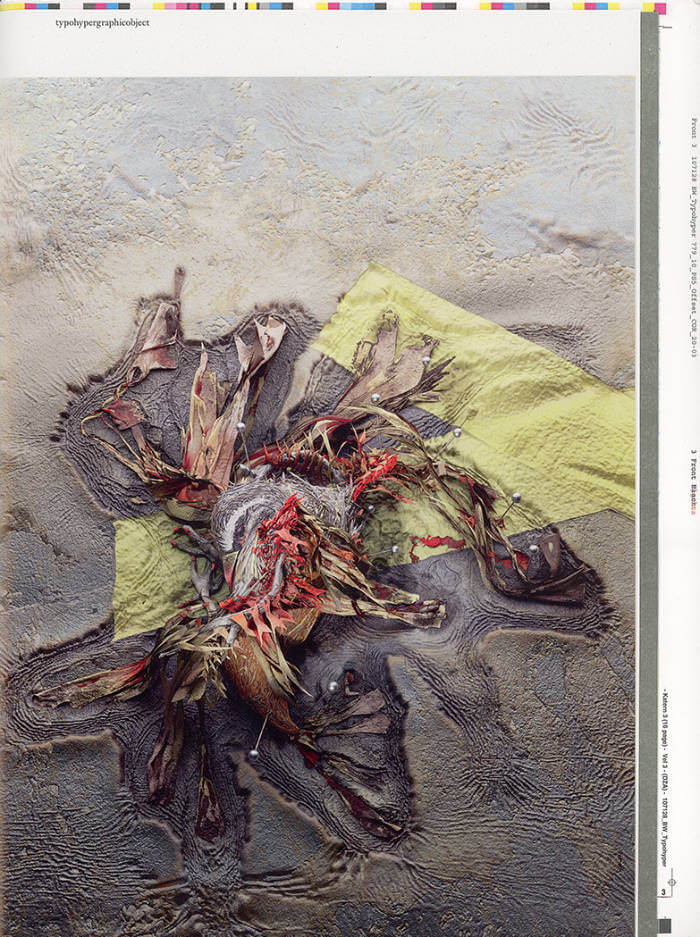
typohypergraphicobject
typohypergraphicobject is a teachable agenda for conscious graphic design.
Written, edited, designed, and published by James Langdon.
typohypergraphicobject is approximately 32×24cm, 52 pages, printed and overprinted in multiple offset and silkscreen inks on make-ready sheets and leftovers from four other books.
Produced with the technical co-operation of die Keure, Bruges; Spreedruck, Berlin; DZA, Altenburg; Kajsa Ståhl, London; OK-RM, London; and Stina Gromark, Stinsensqueeze, Paris.
Contributions from
Brad Haylock
Bryony Quinn
Caleb Klaces and Daisy Hildyard
Gilbert Again with Michael Fowler
Karl Nawrot
Sam Rolfes
Susanne Kriemann

Dominique: The Case of an Adolescent
"Dolto’s Dominique is the only case I’ve found that rivals Freud, and brings us up to date, replete with questions of incestuous trauma, repressed sexualities, autism and cognitive disability, and a profound sense for the contradictions of polite society and histories of colonial and racist violence. I love this child and encountering Dolto’s otherworldly voice as an analyst." — Jamieson Webster
While the child psychoanalyst Françoise Dolto stands alongside Jacques Lacan as a leading light of the Other French School, she has been little translated and remains curiously unknown in the English-speaking world. First published in 1971, Dominique: The Case of an Adolescent is frank and close to the clinical experience. A masterpiece of the genre, it is at once a granular psychological portrait of a troubled adolescent and his familial inheritance, and a historical case study, set in the France of the 1960s, of the of the relationship between subjectivity, nationality, and time and space.
With a foreword by Michael Ryzner-Basiewicz
Translated by Ivan Kats, revised by Lionel and Sharmini Bailly
Cover image by Mike Kelley, Untitled 1975
Françoise Dolto (born 6 November 1908, Paris) was a psychoanalyst and paediatrician. Alongside private practice at her home, where she saw adults and children, Dolto practised in four institutions where she saw only children patients: the Polyclinique Ney, the Centre Claude Bernard, the Hôpital Trousseau and the Centre Etienne Marcel. From 1967 to 1969, Dolto answered adult and child listeners of the French radio station Europe No. 1, live and anonymously under the name ‘Docteur X’. The programme enjoyed excellent ratings, but Dolto found dialogue to be hindered by the demands of live broadcasting and advertising. In 1976, she agreed to return to radio with Lorsque l’enfant paraît on France Inter, on the condition that she replied to listeners’ letters, which enabled her to go into depth. The programme was a huge success, and would make her a household name. In 1978 Dolto retired as an adult psychoanalyst: her fame had become such that it distorted the therapeutic relationship with patients. She now devoted herself to prevention, training of young analysts, group and individual supervision, publications, conferences and radio and television broadcasts. She also continued her work with children in the care of the Aide Sociale à l’Enfance, some of whom she received at her home until the end of her life. In 1979, along with a small team, she founded the Maison Verte, a place for early-years socialisation welcoming children from ages zero to four along with their caregivers, for sessions of play and talk. This model spread throughout France and Europe, to Russia, Armenia and Latin America. Dolto is the author of more than a dozen books, and several essays, interviews and seminars. In English, her books have been translated as Psychoanalysis and Pediatrics (Routeledge, 2013) and The Unconscious Body Image (Routledge, 2022). Françoise Dolto died on 25 August 1988 in Paris.

Witch: Anthology
An exploration of the Witch, as radical archetype, in ancient and contemporary life.
An adult woman haunted by her childhood muses on the foster system, institutions, and the medieval tale of a girl given to a witch. A genderqueer Brooklynite learns of their past life as a murdered sorceress. An uptight participant at a Northern California witch camp finds community in the kitchen. A professor uses magic to help students under attack by right-wing politicians.
In this collection of manifesto, poetry, playscripts, and prose, the archetype of the Witch is honored and unpacked, poked and prodded, owned and othered. From work centered in antiquity to writing which illustrates how primordial occult energies continue to enliven our world today, WITCH: Anthology lays bare a wilderness of myth, magic, trickery, and power swarming beneath the surface of contemporary life.
With work from CAConrad, Edgar Fabián Frías, Amanda Yates Garcia, Ashley Ray, Brooke Palmieri, Yumi Sakugawa, Kai Cheng Thom, Ariel Gore, Myriam Gurba, Fariha Róisín, and many others.
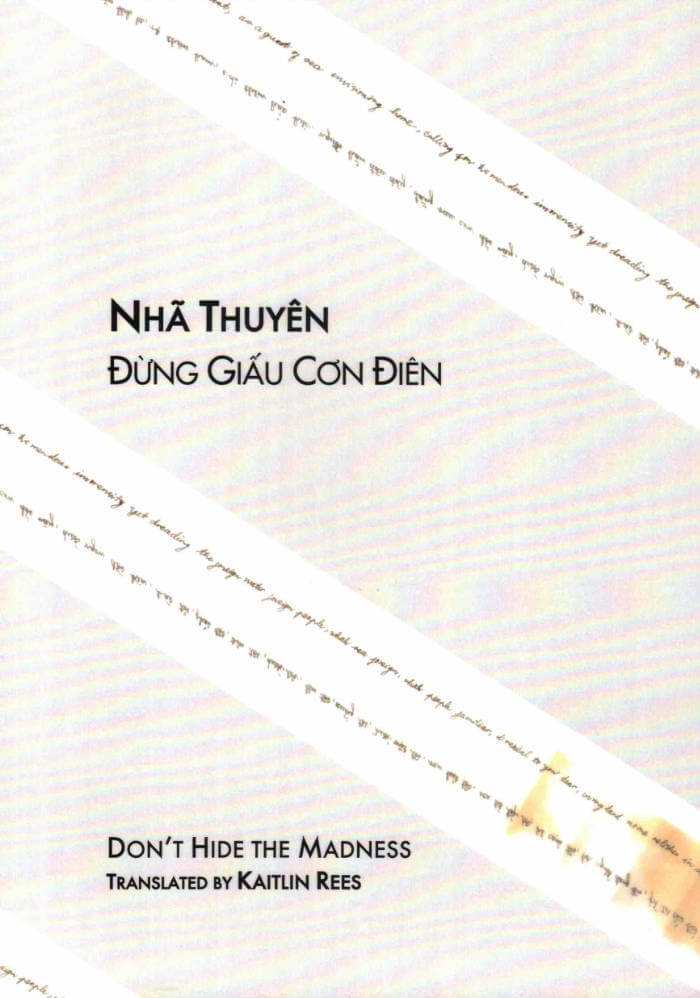
đừng giấu cơn điên / don’t hide the madness
Nhã Thuyên’s đừng giấu cơn điên / don’t hide the madness contains eight poems excerpted from the forthcoming book vị nước (taste of water). To read this work is to be wrenched out of oneself and into the opening and closing world of language: a world in equal parts vegetal, liquid, human, stone, at once bordered river and open sea, enclosed maze and open field; a labyrinth, but a labyrinth of the utmost clarity; a rising or collapsing building made of words that’s not a ‘dwelling’ so much as a refusal to dwell, which is its loneliness and bereftness and consolation and strength, all at once. “Steps here pulled forth by some line of poetry out of time”, such work “fabricate[s] a bed out of sea, build[s] a house out of tremendous immensity”. It’s the result of a lifelong investigation of the Vietnamese language, deep, joyous, scrupulous and sometimes painful; of a lifelong investigation of the whole deep field of history and time as it’s lived deep within the person and in the field beyond the personal that poetic language affords us. This is a realm, not of simple freedom, but of the struggle for the fullest record and the fullest measure towards which a poet can strive. Don’t hide the madness. Don’t be at peace. [D.G.]
NHÃ THUYÊN secludedly anchors herself to Hà Nội, Việt Nam and totters between languages. She has authored several books in Vietnamese and/or in English translations, including viết (writing) (2008), rìa vực (edge of the abyss) (2011), từ thở, những người lạ (words breathe, creatures of elsewhere) (2015), and bất\ \tuẫn: những hiện diện [tự-] vắng trong thơ Việt (un\ \martyred: [self-] vanishing presences in Vietnamese poetry) (2019). Her next book of poetry vị nước (taste of water) is waiting to see the moon. She has been unearthing her notebooks and rubbing her words in Berlin as a 2023 DAAD Artists-in-Berlin fellow, and learning to quietly speak up with care.
KAITLIN REES is a translator, editor, and public school teacher based in New York City. She translates from the Vietnamese of Nhã Thuyên, with whom she co-founded AJAR, the small bilingual journal-press that organizes an occasional poetry festival. Her translations include moon fevers (Tilted Axis, 2019), words breathe, creatures of elsewhere (Vagabond Press, 2016), and the forthcoming book of poetry taste of water.

Songhai!
Askia Touré was there at the birth of the Black Arts Movement. He was there at the birth of Black Power. In the era of decolonisation, Touré’s visionary poems and essays spoke powerfully to the Tricontinental struggle against the forces of colonialism and white supremacy in Latin America, Asia and Africa. They continue to speak to this struggle today. This 50th anniversary edition of Touré’s visionary 1972 book Songhai! is his first UK book publication and provides a powerful guide to the states and stages of Black radical politics not only during and up to 1972, but into our uncertain future.
Reprinted with a new foreword and original preface by Askia Touré, original introduction by John Oliver Killens, and a new introduction by David Grundy. Illustrations by Abdul Rahman.
Askia Touré is one of the pioneers of the Black Arts / Black Aesthetics movement and the Africana Studies movement. Ishmael Reed has called Touré “the unsung poet laureate of cosmopolitan Black Nationalism.” His poetry has been published across the United States and internationally, including in Paris, Rome, India, and The People’s Republic of China. His books include From the Pyramids to the Projects, winner of the 1989 American Book Award for Literature; African Affirmations: Songs for Patriots: New Poems, 1994 to 2004, and Mother Earth Responds. In 1996, he was awarded the prestigious Gwendolyn Brooks Lifetime Achievement award from the Gwendolyn Brooks Institute in Chicago. Now based in Massachusetts, since August 2019, Mr. Touré has been reading with the Makanda Orchestra, beginning with a celebration of the South African musician Ndikho Xaba.
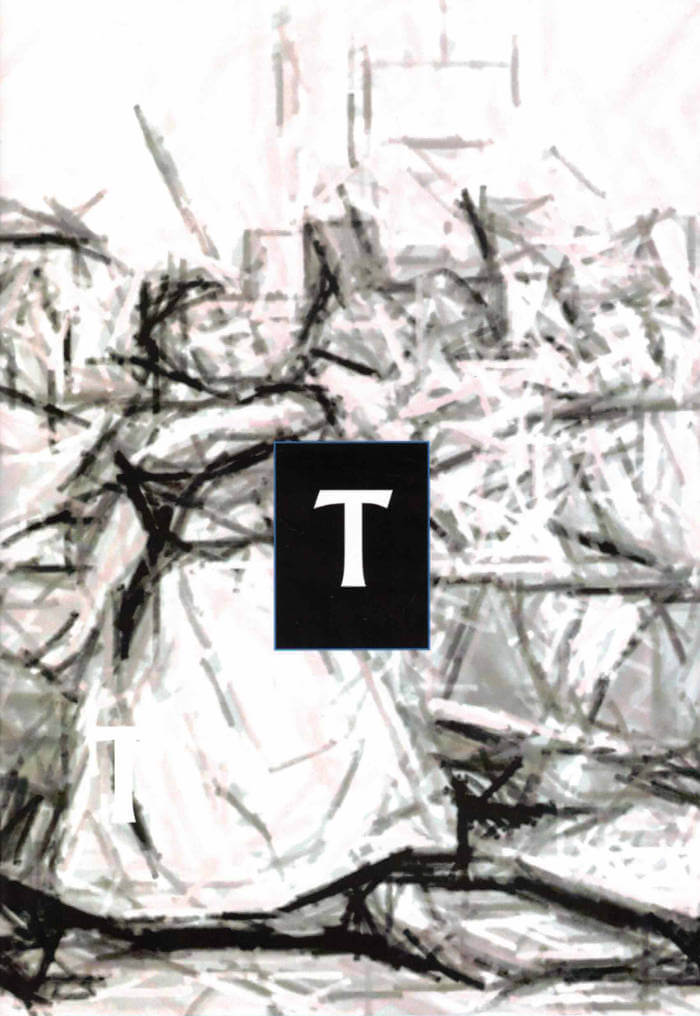
T (poem)
T is a long poem in multiple parts and its author's second book. “The two genders are YES and NO, so you stutter or else shut up forever”.
From the Afterword: "Between 2017-2018 I was involved in a trial with a group of TERFs after a scuffle emerged during a counter protest against a ‘debate’ about sex-based rights in light of proposed reforms to the Gender Recognition Act which would have made trans people’s lives marginally easier. Luckily I wasn’t actually in the dock, but I appeared to give evidence, and for everyone involved it was a humiliating ordeal as we were doxxed, harrassed online and in real life, while the relentless media campaign which ensued took a toll on the entire trans community. The caricaturesque reduction of a complex interrelation of political positions, epistemologies, traumas and personal grievances into two ‘sides’ ultimately worked to further the persecution of trans people, but nevertheless highlighted a social logic on whose terms the so called debate was forced to appear: sex was pitted against gender (or more revealingly ‘gender identity’), objective biology against subjective ‘self-identification’, nature against culture, or perhaps, first nature against second nature."
What does a poet say (what does anyone say), when placed on the stand, how answer the binary logics forced like a cage in the legally-grounded violence which splittingly interrogates solidarity, the splitting invocation of law? In answer, T spreads across the page as if desperately finding a form for speech acts forced into a garrotted tick-box, a witness stand, video evidence, Nature’s originary disguise as history or vice versa, wrapped inside ‘common sense’ as a pronominal shroud, in the policing of body, speech, and every fungible fibre of being. The author writes: “I want the whole text to be a kind of horrific inorganic body with awkward parts, both to replay at the level of form some of the critiques of organicist thinking with reference to nature that the poem tries to articulate, and also, more glibly, to be somewhat like a trans body, awkwardly fitting together with some parts undercutting others”. An extended enquiry into Materialism and its material (fleshed) stakes, driven through the heart and to the heart of things, T sees lyric poem shudder to line-broken essay to fragment of play to citational drop; in tight compression sprawling, a poem whose argument is necessary and necessarily incomplete, poetry can do thinking, this thinking we do outside and within it, sprung trap, open and closing door.

Writing on Raving
McKenzie Wark, Zoë Beery and 1 more
Writing on Raving is the definitive mix of voices from the Brooklyn underground rave scene and beyond, providing fresh language for the shared and infinitely varied experience of dancing through the night until the morning.
New York rave culture is having a moment. The music, mostly, is techno, certain flavors of which became the soundtrack to a dancefloor culture that is queer in a different way to house music centered gay nightlife. Wark, Mak and Beery want to document and annotate and celebrate, but also critique, this world in the making. Writing on Raving centers the New York scene, but isn't limited to it.
This is a book for all of those who need the rave. Who need to dance. Who have at some point needed that beat in their lives. This is a book for all those who have journeyed through the night, through sound, through movement, through chemistry, into other places, other times, other encounters.
This seeking gives us hours, years, on the dance floor to think about why we rave, to locate these reasons in our bodies and the space around us. But the rave is not the place to articulate them. It is too loud; our friends are too distracted, or too high. At the afters, tired and drained and covered in schmutz, we think some more. We look around at our raver friends, and wonder: How did we get here? What happened to us? What is this tentacular, thrashing, swelling thing that we all made together? That thing that is now slumped and aching and coming down now into our fragmentary, singular lives
Between all of us, there are many answers to such questions. Wark, Mak and Beery have gathered their favorite ones to share in this first-ever anthology of writing on raving.
McKenzie Wark is a writer and scholar based in New York City. She is the author, among other things, of Raving (2023) and Life Story (2024).
Geoffrey Mak is the author of Mean Boys: A Personal History (Bloomsbury, 2024).
Zoë Beery is a freelance journalist based in Brooklyn, and a nightlife harm reduction organizer at parties and festivals in the U.S. and Europe.

Joan Jonas
An extensive catalog dedicated to Jonas' under-explored drawing practice.
The installation, performance and video works of American artist Joan Jonas (born 1936) are emblematic of the '70s-'80s downtown New York avant-garde. Jonas privileged form over content, generating rigorous pieces with thematic concerns such as time, space and feminine subjectivity. Significant as these works are, other parts of Jonas' diverse and dynamic oeuvre deserve their due attention. This book is the first comprehensive catalog to elucidate an under-examined component of the artist's practice. Fascinated by the tension between motion and transcription, Jonas developed "endless drawings" composed of lines that weave around themselves or through a grid. She also began to draw natural things – plants, animals, minerals – both from her own environment and from fiction.
Published in conjunction with the exhibition at the Drawing Center, this volume examines several decades of Jonas' drawing practice, presented in chronological order. The drawings are accompanied by extensive images from the artist's notable performances and exhibitions.
Foreword by Annie Ratti, Fabio Cavallucci. Text by Marina Warner, Joan Jonas, Anna Daneri, Roberto Pinto, Cristina Natalicchio, Andrea Mattiello.

Vampyroteuthis Infernalis
L'édition inédite et définitive (établie à partir des tapuscrits originaux en français) du traité fabuleux du philosophe tchéco-brésilien Vilém Flusser (1920-1991), une fiction philosophique et poétique qui, par des chemins détournés, nous confronte à la violence et à l'impasse des sociétés contemporaines.
Un monstre venu des profondeurs de l'océan, un poulpe vampire. Sa violence rappelle les nazis, ses mœurs sont libertaires et libidineuses. C'est une créature infernale, cannibale et brutale, pouvant changer de couleur à volonté, et dotée de trois pénis.
Et c'est notre cousin.
Dans cette fable fantastique, Vampyroteuthis infernalis émerge, non des abysses de l'océan, mais du plus profond de nous-mêmes pour nous tendre un miroir, nous montrer à quel point nous, les hommes, sommes ses proches parents et que nos histoires, nos sociétés, nos modes de vie ne sont, au fond, pas si différents.
Ce texte délibérément provocateur du philosophe tchéco-brésilien Vilém Flusser (1920-1991) n'est ni scientifique, ni objectif : c'est une fiction philosophique et poétique qui, par des chemins détournés, nous confronte à la violence et à l'impasse des sociétés contemporaines.
Flusser avait écrit ce texte en français (outre des versions en allemand et en portugais), et ce livre est la première édition du texte original en français. Il est accompagné des fantastiques dessins de son ami l'artiste et « zoosystémicien » français Louis Bec (1936-2018), co-auteur du livre, traduisant en images pseudo-scientifiques les chimères vampyroteuthiques.
Des essais de Marc Lenot, Élise Rigot et Florent Barrère éclairent la démarche de Flusser et de Bec.

A Palestine Solidarity Zine #2
Tamara Hartman, Tabea Nixdorff
This zine is dedicated to documenting the effects of our witnessing on our own work, and on our understanding of the world.Writing down our experiences, reflections and continuously being in conversation, is also rooted in the conviction that we have to build our own archives. We see the enormous efforts undertaken by governments and lobby groups to censor, criminalise and repress the circulation of knowledges, stories and experiences that dismantle zionism, one of the many ideologies that in fact make no one safer, but instead exopse the cruel adaptiveness of colonialism to specific imperial aspirations.
With contributions by Mahmud Abu-Odeh, Gráinnemir Amir Abualrob, Anita di Bianco, Flip Driest, Moosje M. Goosen, Tamara Hartman, Canan Marasligil, Tabea Nixdorff, Shira Wolfe.

Saint is its/Conviction
13 poems of various length.
"I have used a procedure to write them and I am happy to share it, but it isn't what's most important about these poems. The subject matter that, I eventually realised, they share to the extent of justifying bundling them up in one pamphlet is religiosity, what stands between belief and act, be it faith or trust."

Les Metamorpheauxses
Publié en 2025 dans le cadre du projet d'art public The River as Habitat installé dans le Lycée Edward Steichen, Clervaux et commandité par l'administration des bâtiments publics, Luxembourg.

Tout geste est renversement – Every gesture is reversal
Chloe Chignell, Laurianne Bixhain
Tout geste est renversement – Every gesture is reversal is a publication by artist Laurianne Bixhain comprising an imahe captured and silkscreen printed by Bixhain and a text written by Chloe Chignell. The work addresses the potential for mutual transformation between language and materials, whether human or non human. How does language traverse the body? What are its resonances? How does it shape physical presence, gestures or thoughts?
A2 silkscreen printed poster
Designed by Morgane Le Ferec.
Printed in 300 Copies.
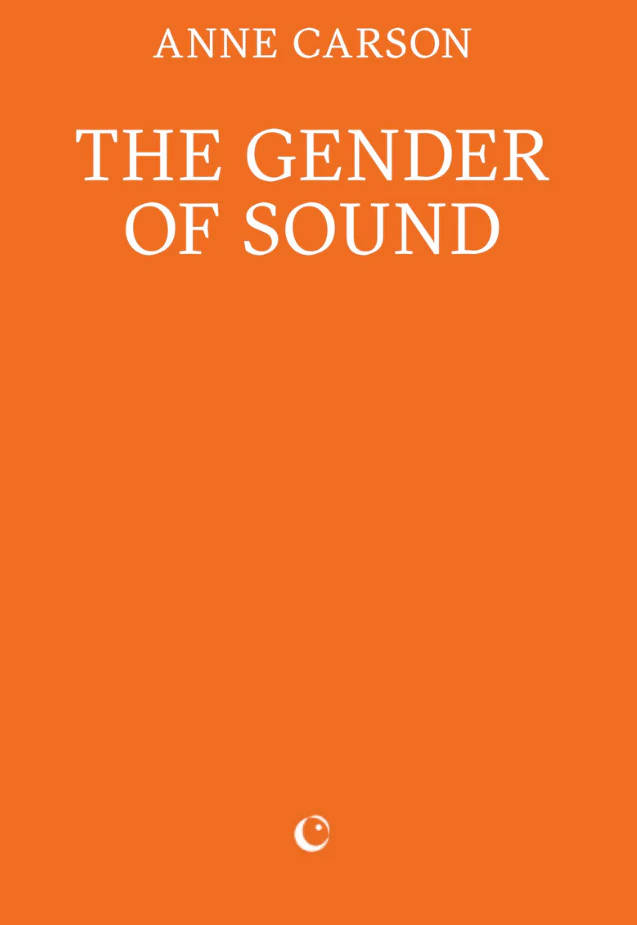
The Gender of Sound
Human history is filled with unacceptable sounds: high-pitched voices, gossip, talkativeness, hysteria, wailing and ritual shouts. Who makes them? Those deviant from or deficient in the masculine ideal of self-control: women, catamites, eunuchs and androgynes all fall into this category.
From the myths of antiquity to Margaret Thatcher via Sigmund Freud and Gertrude Stein, The Gender of Sound charts the gendering of sound in Western culture. Carson invites us to listen again, and in doing so to reimagine our conceptions of human order, virtue and selfhood.
Putting a door on the female mouth has been an important project of patriarchal culture from antiquity to the present day. Its chief tactic is an ideological association of female sound with monstrosity, disorder and death.

Survival Takes a Wild Imagination: Poems
In the powerful follow up to her critically acclaimed debut collection, poet and activist Fariha Róisín is writing, praying, clawing, and scratching her way out of the grips of generational trauma on the search for the freedom her mother never received and the kindness she couldn’t give.
This collection of poetry asks a kaleidoscope of Who is my family? My father? How do I love a mother no longer here? Can I see myself? What does it mean to be Bangladeshi? What is a border? Innately hopeful and resolutely strong, Fariha's voice turns to the optimism and beauty inherent in rebuilding the self, and in turn, the world that the self moves through. Ubiquitous to the human experience, Survival Takes a Wild Imagination is an illuminating breath of fresh air from a powerful poetic voice.

Oh You Nameless And New-Named Ridges
Bernadette Mayer, Lee Ann Brown
Poets Lee Ann Brown and Bernadette Mayer, old friends, began a specific correspondence in early 2020 with the intention of editing them into a book. The poems, letters, letter-poems, pletters, cover the first songbirds of spring, works and advice from friends, art, lists from the messy old internet, the possibility of seeing one another again, some day. Bernadette passed away on November 22, 2022, 3 weeks before this book was completed and bound. Throughout the text Lee Ann and Bernadette merge two distinct and unique voices in both a poetic, loving and humorous sharing. In a letter from Bernadette to Lee Ann she writes: “I imagine the voice to be/ yrs/ Because it is/not/mine.”

The Mirror of Simple Souls
In her first book of poems, Leah Flax Barber revives an actress figure of the commedia dell'arte to consider her own destiny as a soon-to-be historical subject. Taking its title from Marguerite Porete's fourteenth-century Beguine classic, The Mirror of Simple Souls embodies the metaphysical thorniness of the book-as-object through sources as wide-ranging as Renaissance theater, Low German and Old French mystical texts, Kate Bush lyrics, and the melancholy dialectics of Walter Benjamin. In Flax Barber's stark, brutally compressed poems, the performance of writing is charged with the eros and anxiety of coming after: "Will it all be destroyed? / Definitely / I will hear it on my radio / In the 22nd century."
The Mirror of Simple Souls, a series of repeated beginnings and endings, is a form of speech act which, through a Freudian Durcharbeiten, or working through, brings about a new beginning. And, in its movement from this Freudian "working through" to a Hegelian Aufhebung, lets us begin, again, at the beginning, at the end. —CYNTHIA CRUZ
The spare poems of The Mirror of Simple Souls evoke and then draw back into shimmer. Herein, a performance that suffuses the horizon with beautiful absurdity: a shirt sewn with mirrors that reflect a strange and evanescing world-at-large, “an I where the nay was.” Drawing from film, mystical texts, commedia dell'arte, the reader finds that there “is paraphernalia of life / all over.” This paraphernalia is a kind of “segue music” for the endlessly indeterminate. The old adage claims that we can’t step into the same river twice, but Leah Flax Barber creates an evocative, provocative current through which each step is at once past, present, and future. —ELIZABETH ROBINSON
Leah Flax Barber is a daring and brilliant new poet. Her voice is restless and coiled and sprung as we discover "The demonic finalist / Of material culture / Is love / There is paraphernalia of life / All over / A woman.” There is also a take-no-prisoners attitude throughout this startling and powerful book. These poems are vital and necessary and perform “The wounded chance / To think in public.” This book will move you, scare you, and blow you away. —PETER GIZZI
Leah Flax Barber's first book reads like a journey, a kind of anabasis, passing back through the myth and history which are its own antecedents. It manifests, in the encounter, a saturnalian world: ludic, dark and sensuous, strange and vibrant with thought. I was delighted to travel with it. —CLAIRE DeVOOGD